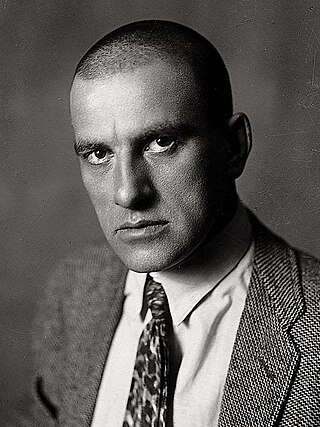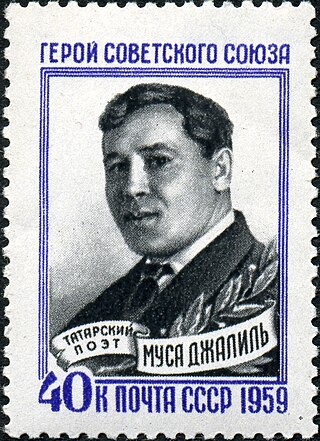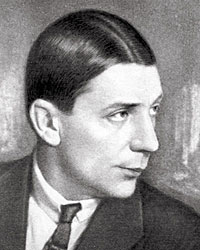External links
Avant-garde movements | |||||
|---|---|---|---|---|---|
| Visual art |
| ||||
| Literature and poetry | |||||
| Music |
| ||||
| Cinema and theatre | |||||
| General | |||||
| Authority control databases: National |
|---|
Imaginism was a Russian avant-garde poetic movement that began after the Revolution of 1917.
Imaginism was founded in 1918 in Moscow by a group of poets including Anatoly Marienhof, Vadim Shershenevich, and Sergei Yesenin, who wanted to distance themselves from the Futurists; the name may have been influenced by imagism.
Stylistically, they were heirs to Ego-Futurism. Imaginists created poetry based on sequences of arresting and uncommon images. They wrote many verbless poems. [1]
Other members of the group were the poets Rurik Ivnev, Alexander Kusikov, Ivan Gruzinov, Matvey Royzman, and the prominent Russian dramatist Nikolay Erdman. In January 1919 they issued a manifesto, whose text was largely written by Shershenevich.
Most of the imaginists were freethinkers and atheists. Imaginism had its main centres in Moscow and St. Petersburg. There were also smaller centres of imaginism in Kazan, Saransk, and Ukraine. Imaginists organised four poetry publishing houses, one of which was called simply Imaginism, and published the poetry magazine Gostinitsa dlya puteshestvuyuschih v prekrasnom ("Guesthouse for travellers in the beautiful").
The group broke up in 1925, and in 1927 it was liquidated officially. Its heritage, though, is still strong in Russia. Poems by Yesenin and Shershenevich, memoirs by Marienhof, and plays by Erdman are still in print and always in demand.
After the disappearance of the group, the "young imaginists" declared themselves followers of this trend in the early 1930s, and so did the "meloimaginists" of the 1990s. [2]
Acmeism, or the Guild of Poets, was a modernist transient poetic school, which emerged c. 1911 or in 1912 in Russia under the leadership of Nikolay Gumilev and Sergei Gorodetsky. Their ideals were compactness of form and clarity of expression. The term was coined after the Greek word ἀκμή (akmē), i.e., "the best age of man".

Russian literature refers to the literature of Russia, its émigrés, and to Russian-language literature. Major contributors to Russian literature, as well as English for instance, are authors of different ethnic origins, including bilingual writers, such as Kyrgyz novelist Chinghiz Aitmatov. At the same time, Russian-language literature does not include works by authors from the Russian Federation who write exclusively or primarily in the native languages of the indigenous non-Russian ethnic groups in Russia, thus the famous Dagestani poet Rasul Gamzatov is omitted.

Vladimir Vladimirovich Mayakovsky was a Russian poet, playwright, artist, and actor. During his early, pre-Revolution period leading into 1917, Mayakovsky became renowned as a prominent figure of the Russian Futurist movement. He co-signed the Futurist manifesto, A Slap in the Face of Public Taste (1913), and wrote such poems as "A Cloud in Trousers" (1915) and "Backbone Flute" (1916). Mayakovsky produced a large and diverse body of work during the course of his career: he wrote poems, wrote and directed plays, appeared in films, edited the art journal LEF, and produced agitprop posters in support of the Communist Party during the Russian Civil War of 1917–1922.
Russian formalism was a school of literary theory in Russia from the 1910s to the 1930s. It includes the work of a number of highly influential Russian and Soviet scholars such as Viktor Shklovsky, Yuri Tynianov, Vladimir Propp, Boris Eichenbaum, Roman Jakobson, Boris Tomashevsky, Grigory Gukovsky who revolutionised literary criticism between 1914 and the 1930s by establishing the specificity and autonomy of poetic language and literature. Russian formalism exerted a major influence on thinkers like Mikhail Bakhtin and Juri Lotman, and on structuralism as a whole. The movement's members had a relevant influence on modern literary criticism, as it developed in the structuralist and post-structuralist periods. Under Stalin it became a pejorative term for elitist art.

American poetry refers to the poetry of the United States. It arose first as efforts by American colonists to add their voices to English poetry in the 17th century, well before the constitutional unification of the Thirteen Colonies. Most of the early colonists' work was similar to contemporary English models of poetic form, diction, and theme. However, in the 19th century, an American idiom began to emerge. By the later part of that century, poets like Walt Whitman were winning an enthusiastic audience abroad and had joined the English-language avant-garde.
Deep image is a term coined by U.S. poets Jerome Rothenberg and Robert Kelly in the second issue of the magazine Trobar in 1961. They used the term to describe poetry written by Diane Wakoski, Clayton Eshleman, and themselves.

Musa Cälil was a Soviet–Tatar poet and resistance fighter. He is the only poet of the Soviet Union awarded simultaneously the Hero of the Soviet Union award for his resistance fighting and the Lenin Prize for having written The Moabit Notebooks; both awards were bestowed upon him posthumously.

Sergei Alexandrovich Yesenin, sometimes spelled as Esenin, was a Russian lyric poet. He is one of the most popular and well-known Russian poets of the 20th century. One of his narratives was "lyrical evocations of and nostalgia for the village life of his childhood – no idyll, presented in all its rawness, with an implied curse on urbanisation and industrialisation".

Apollon Nikolayevich Maykov was a Russian poet, best known for his lyric verse showcasing images of Russian villages, nature, and history. His love for ancient Greece and Rome, which he studied for much of his life, is also reflected in his works. Maykov spent four years translating the epic The Tale of Igor's Campaign (1870) into modern Russian. He translated the folklore of Belarus, Greece, Serbia and Spain, as well as works by Heine, Adam Mickiewicz and Goethe, among others. Several of Maykov's poems were set to music by Russian composers, among them Rimsky-Korsakov and Tchaikovsky.

Nikolay Alekseyevich Zabolotsky was a prominent Soviet and Russian poet and translator.

Rurik Ivnev, born Mikhail Alexandrovich Kovalyov, was a Russian poet, novelist and translator.

Vadim Gabrielevich Shershenevich was a Russian poet. He was highly prolific, working in more than one genre, moving from Symbolism to Futurism after meeting Marinetti in Moscow. Later he pioneered the post-revolutionary avant-garde Imaginist movement, but abandoned it in favour of the theatre.

Yakov Grigoryevich Blumkin was a Left Socialist-Revolutionary, a Bolshevik, and an agent of the Cheka and the Joint State Political Directorate (OGPU).
Pranas Morkūnas was a Lithuanian translator and dadaist poet.

Ego-Futurism was a Russian literary movement of the 1910s, developed within Russian Futurism by Igor Severyanin and his early followers. While part of the Russian Futurism movement, it was distinguished from the Moscow-based cubo-futurists as it was associated with poets and artists active in Saint Petersburg.

Nikolai Robertovich Erdman was a Soviet dramatist and screenwriter primarily remembered for his work with Vsevolod Meyerhold in the 1920s. His plays, notably The Suicide (1928), form a link in Russian literary history between the satirical drama of Nikolai Gogol and the post-World War II Theatre of the Absurd.

Anatoly Kudryavitsky is a Russian-Irish novelist, poet, editor and literary translator.

Anatoly Borisovich Marienhof or Mariengof was a Russian poet, novelist, and playwright. He was one of the leading figures of Imaginism. Today, he is remembered mostly for his memoirs depicting Russian literary life in the 1920s and his friendship with Sergei Yesenin.
SurVision is an international English-language surrealist poetry project, comprising an online magazine and a book-publishing outlet. SurVision magazine, founded in March 2017 by poet Anatoly Kudryavitsky, was a platform for surrealist poetry from Ireland and the world. SurVision Books, the book imprint, started up the following year.